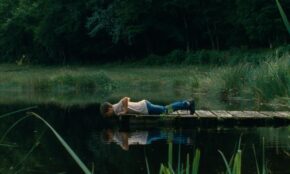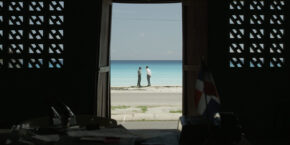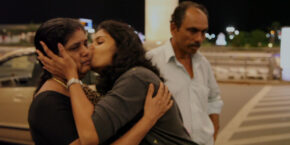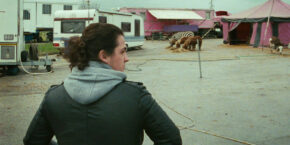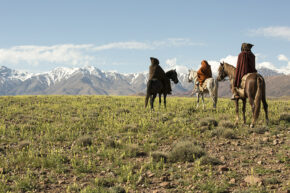Jay Kuehner
Menus-Plaisirs – Les Troisgros (Frederick Wiseman, US)
By Jay Kuehner | 01/17/2024 | CS97, Currency, From Cinema Scope Magazine
Given the stylistic consistency yet markedly disparate subject matter of his vast oeuvre to date, it is curious to consider what, if anything, constituted the precedent for his latest film, Menus-Plaisirs – Les Troisgros, a typically protracted look at an historically family-run restaurant near Lyon.
Read More → TIFF 2023 | They Shot the Piano Player (Fernando Trueba, Javier Mariscol, Spain/France) — Centrepiece
By Jay Kuehner | 09/05/2023 | Cinema Scope Online, TIFF 2023
By Jay Kuehner The dulcet caress of bossa nova often belies a sense of soft anguish and deep melancholy, the form giving expression to an excess of longing in both lyrical and musical form. Something similar might be said of Fernando Trueba and Javier Mariscol’s tribute to one of the genre’s lost virtuoso pianists, Francisco…
Read More → Astrakan (David Depesseville, France)
By Jay Kuehner | 06/20/2023 | CS95, Currency, From Cinema Scope Magazine
By Jay Kuehner The reassurance implicit in the coming-of-age story is that of things foregone, universal, known; the particularities of the passage are shorn of their severity and exigence. The subject is supposed, invariably, to have arrived, their journey ultimately delineated in retrospect. The entropy of heightened subjectivity is at last externalized and made legible.…
Read More → The Adventures of Gigi the Law (Alessandro Comodin, Italy/France/Belgium)
By Jay Kuehner | 01/10/2023 | CS93, From Cinema Scope Magazine, Spotlight
Not since Corneliu Porumboiu’s Police, Adjective (2009) has a cop movie been so sublimely uneventful as Alessandro Comodin’s The Adventures of Gigi the Law, a slack portrait of an affable officer in Friuli’s polizia locale. Pier Luigi Mecchia (a.k.a Gigi)—the director’s real-life uncle, effectively playing himself—performs his perfunctory patrol in the town of San Michele al Tagliamento, but Comodin’s film is more modern pastoral than police procedural.
Read More → Timely Circumstances: Cyril Schäublin on “Unrest”
By Jay Kuehner | 09/27/2022 | CS92, From Cinema Scope Magazine, Interviews
I think this is the critical question now: how do we chart our history? How do we reimagine a truer solidarity? Maybe the film allows us to imagine other possibilities.
Read More → TIFF 2022 | Unrest (Cyril Schäublin, Switzerland) — Wavelengths 
By Jay Kuehner | 09/07/2022 | Cinema Scope Online, TIFF 2022
By Jay Kuehner Published in Cinema Scope #92 (Fall 2022) “Not only should man know what he is making, but if possible he should see how it is used—see how nature is changed by him. Every man’s work should be an object of contemplation for him.”—Simone Weil, La condition ouvrière Anarchic in spirit but formally…
Read More → The Tale of King Crab (Alessio Rigo de Righi, Matteo Zoppis, Italy/France/Argentina)
By Jay Kuehner | 03/21/2022 | CS90, Currency, From Cinema Scope Magazine
Rigo de Righi and Matteo Zoppis expand and deflate, by slyly cinematic means, upon a tradition of racconti popolari and fiabe.
Read More → El Gran Movimiento (Kiro Russo, Bolivia/France/Qatar/Switzerland)
By Jay Kuehner | 01/04/2022 | CS89, Fall Festival Spotlight, Festivals, From Cinema Scope Magazine, Spotlight
By Jay Kuehner The tacit assumption of the “city symphony” is of a metropolis invariably harmonious, conducive to and cooperative with the machinations of both camera and director, the coalescence of an industrial apparatus. Kiro Russo’s native La Paz defies any such arrangement in El Gran Movimiento, which channels the inherent dissonance and manifest disparity…
Read More → TIFF 2021 | Bergman Island (Mia Hansen-Løve, France)
By Jay Kuehner | 09/15/2021 | Cinema Scope Online, TIFF 2021, TIFF Coverage & Reviews
By Jay Kuehner The concept of a Bergman Safari on the island of Fårö is something that not even a Roy Andersson would have conceived of, but it’s a tour bus that many cinephiles have been riding for years, like it or not. The punchline afforded in Mia Hansen-Løve’s faintly brackish, irreverent homage is that…
Read More → TIFF 2021 | Spencer (Pablo Larraín, UK/Germany)
By Jay Kuehner | 09/14/2021 | Cinema Scope Online, TIFF 2021, TIFF Coverage & Reviews
By Jay Kuehner Come for the Di, but stay for the Pablo. Having followed the moves of the Chilean autor far more than that of any royal family member, I thought the strategy was sound enough to suffer the eternal hors d’oeuvre of crustless sandwiches and acrid tea that is monarchy-watching. If Larraín, in Tony…
Read More → TIFF 2021 | A Hero (Asghar Farhadi, Iran)
By Jay Kuehner | 09/14/2021 | Cinema Scope Online, TIFF 2021, TIFF Coverage & Reviews
By Jay Kuehner An unexpected insight is proffered in Asghar Farhadi’s A Hero by the maligned creditor Bahram, who speculates whether good deeds have become so scarce in society that they warrant congratulation. Much of Farhadi’s moral tale revolves around the appearance of virtue and all of its attendant deceptions, conjuring a very modern anxiety…
Read More → Azor (Andreas Fontana, Switzerland/France/Argentina)
By Jay Kuehner | 06/15/2021 | CS87, Currency, From Cinema Scope Magazine
Mark Twain’s quote that virtue has never been as respectable as money could easily delineate the sumptuously sordid habitat limned in Azor, except that it's precisely the kind of wisdom that the film’s wealthy habitués and their attendant financiers might invoke with complacent irony from within their insulated milieu of smoky parlours, agapanthus-lined lobbies, manicured hippodromes, and dutifully swept piscinas.
Read More → Impresión de un cineasta: On the Films of Camilo Restrepo
By Jay Kuehner | 03/20/2020 | CS82, Features, From Cinema Scope Magazine
The title of Camilo Restrepo’s breakout short film, Impressions of a War (2015), suggests the anomalies inherent in conceiving of a historical portrait of modern Colombia. A war is not typically thought of as something that leaves an impression; rather, it maims, disables, obliterates, defaces, violates. Nor does its legacy register as a mere impression: the cumulative trauma amounts to nothing less than an indelible scar, both corporeal and psychological, that exceeds reason, conciliation, and memory.
Read More → Collective (Alexander Nanau, Romania/Luxembourg)
By Jay Kuehner | 12/29/2019 | CS81, From Cinema Scope Magazine, Spotlight
By Jay Kuehner As the opening credits of Alexander Nanau’s Collective rolled at a screening at TIFF, a fellow critic leaned to me and whispered, in a mantra-like tone, the name of an indelible Chinese documentary: Karamay. The implied message was tacitly understood: that Xu Xin’s colossal 2010 work on the aftermath of the eponymous…
Read More → Cocote (Nelson Carlo de Los Santos Arias, Dominican Republic/Argentina/Germany)
By Jay Kuehner | 12/19/2017 | CS73, Fall Festival Spotlight, Features, From Cinema Scope Magazine, Spotlight
By Jay Kuehner The titular nape of the neck invoked in the word cocote is both a marked corporeal designation and an intimation of something bad about to happen. In Cocote, it represents the site of a beheading and the dreaded aura of imminent retribution. If hacer cogote translates as “to expect something,” then such…
Read More → Araby (Affonso Uchôa and João Dumans, Brazil)
By Jay Kuehner | 06/23/2017 | CS71, Currency, From Cinema Scope Magazine
By Jay Kuehner An epistolic ode to labour, love, and life on the road, Affonso Uchôa and João Dumans’ Araby opens with a seemingly innocuous sequence that belies its ambition: teenage Andre (Murilo Caliari) pedalling his bike on a mountain road in the southern Brazilian state of Minas Gerais, a Townes Van Zandt song on…
Read More → Sundance (II): A Few Useful Details
By Jay Kuehner | 03/24/2017 | Columns, CS70, Festivals, From Cinema Scope Magazine
By Jay Kuehner At a Q&A after a well-received screening of Eliza Hittman’s film Beach Rats, which earned her the Directing Award in the US Dramatic competition, the Cal Arts grad spoke of the aesthetic need to “de-emphasize story”—an admission that, in the context of Sundance’s high priority for narrative takeaways, might well have constituted…
Read More → Austerlitz (Sergei Loznitsa, Germany)
By Jay Kuehner | 12/19/2016 | CS69, Fall Festival Spotlight, Festivals, From Cinema Scope Magazine, Spotlight
By Jay Kuehner If poetry after Auschwitz constituted an act of barbarism, then what can be made of curious tourists eating sandwiches, or snapping self-portraits, on the lawns of former concentration camps now repurposed as museums? The question isn’t so much posed as interrogatively embedded in Austerlitz’s conceptual framework, in which “dark tourism” is subjected…
Read More → Locarno (I): Challenges
By Jay Kuehner | 09/26/2016 | Columns, CS68, Festivals, From Cinema Scope Magazine
By Jay Kuehner With its boldly stylized design, looking otherworldly but extracted from the all-too-real, and replete with excess—not least a purring pet cheetah lounging on ornate carpet and riding in a luxury sports car, and a brotherhood of Muslim bikers astride sparkling choppers—The Challenge could double as a wayward film-festival advert. Yuri Ancarani’s Filmmakers…
Read More → India in a Day (Richie Mehta, India/UK) — TIFF Docs
By Jay Kuehner | 09/17/2016 | Cinema Scope Online, TIFF 2016
By Jay Kuehner Never mind the city symphony—here is the cacophony of an entire country. The “user-generated doc” is enlisted to reveal (or effectively colonize, depending on your view) its own vast territory, in this case the world’s largest democracy, India. By virtue of sheer plurality and simultaneity—and under the dubious tutelage of Ridley Scott…
Read More → Maliglutit (Searchers) (Zacharias Kunuk, Canada) — Platform
By Jay Kuehner | 09/16/2016 | Cinema Scope Online, TIFF 2016
By Jay Kuehner There’s something poetic in the notion of an indigenous reworking of John Ford’s The Searchers (1956), although it does not appear to be the motivating principle behind Zacharias Kunuk’s Maliglutit, which fashions itself as a western told in an Inuit way. There are of course a host of political/theoretical implications to such…
Read More → Mister Universo (Tizza Covi & Rainer Frimmel, Austria/Italy) — Contemporary World Cinema)
By Jay Kuehner | 09/02/2016 | Cinema Scope Online, TIFF 2016
By Jay Kuehner An unfit lion tamer quits his circus and sets out on the road in rural Italy in search of a lost iron amulet, bent by a notorious strongman years before. So goes the wandering premise of Mister Universo—seemingly descended from the stock mythology of Fellini but quite contrarily possessed of its own…
Read More → Mimosas (Oliver Laxe, Spain/Morocco/Qatar/France)
By Jay Kuehner | 06/27/2016 | CS67, Festivals, From Cinema Scope Magazine, Spotlight
By Jay Kuehner A Sufi western? In the parole of Cannes’ critical taxonomy, the designation bestowed upon Oliver Laxe’s desert-fevered, Semaine de la Critique-winning allegory would seem reductive if it didn’t allude, paradoxically, to the film’s radically expansive nature. This leads one to wonder just what “a Sufi western” might look like, or how it…
Read More → Set Sail With Salt, Return With Sugar: The 10th Punto de Vista Documentary Film Festival of Navarra
By Jay Kuehner | 03/24/2016 | Cinema Scope Online
By Jay Kuehner Relatively nascent as festivals go, Punto de Vista celebrated its tenth anniversary with an edition predicated upon the concept of time, a programmatically tautological conceit that could too easily lend itself to pejorative claims of plucking low-hanging fruit: all film, somehow, partakes of time. But how to account for, in cinematically specific…
Read More → Two Years at Sea: An Interview with Mauro Herce
By Jay Kuehner | 12/21/2015 | CS65, From Cinema Scope Magazine, Interviews
By Jay Kuehner A post-industrial trance film set aboard a phantom-like freighter drifting toward shipwreck or oblivion, Dead Slow Ahead materializes its eponymous nautical telegraph into an abstract state of voluptuous inertia. The merchant ship Fair Lady is adrift in unspecified international waters, her crew diminished (if not devoured) by the machinery of the vessel…
Read More → Who Can Tell of the Heroic Deeds of Israel?: Nadav Lapid’s The Kindergarten Teacher
By Jay Kuehner | 12/17/2014 | CS61, Features, From Cinema Scope Magazine, Interviews, Top Ten Films 2014
By Jay Kuehner. Films are often described as being “poetic,” but beyond the suggestion of a certain undefined lyricism, it is not entirely clear just what this means. Unrequited love, for example, might be given supple expression through an ambient absence, or the cruel passage of time might be suggested by the fixity of the…
Read More → Stop the Pounding Heart (Roberto Minervini, USA/Italy/Belgium
By Jay Kuehner | 06/25/2014 | CS59, Currency, From Cinema Scope Magazine
By Jay Kuehner Faith, so often deployed as narrative substance, is a phenomenon (or noumenon) that’s difficult to represent with film. It is often reduced to milieu, mood, or mere matter: think transcendental styles and stylized transcendance, either abstractly implied or imposed in formulary fashion (Bresson’s ascetic methodology vis-à-vis Malick’s metaphysical morass). A character either…
Read More → Mouton (Gilles Deroo and Marianne Pistone, France)
By Jay Kuehner | 12/13/2013 | CS57, Festivals, From Cinema Scope Magazine, Spotlight
By Jay Kuehner Some mysteries aren’t meant to be solved, and Mouton (no, this isn’t another film about sheep) from first-time directors Gilles Deroo and Marianne Pistone, is the latest in a budding field of beautifully irreducible tales—blessed with the imprimatur of Locarno’s Opera Prima award—that refracts its subject through a prismatic approach to narrative.…
Read More → TIFF 2013 | Bethlehem (Yuval Adler, Israel)—Discovery
By Jay Kuehner | 09/11/2013 | Cinema Scope Online, TIFF 2013
By Jay Kuehner Utterly circumscribed by its political geography, Yuval Adler’s Bethlehem delineates the Israeli-Palestinian conflict through the eyes of a Palestinian teen, Sanfur, who at film’s outset is boldly protesting to his peers that he’s got the nerve to take a bullet to the chest (aided by a protective vest presumably looted from Israeli officers). That…
Read More → TIFF 2013 | Ida (Pawel Pawlikowski, Poland)—Special Presentation
By Jay Kuehner | 09/11/2013 | Cinema Scope Online, TIFF 2013
By Jay Kuehner Pawel Pawlikowski’s return in letter and spirit to his native Poland is an elegiac, quasi-pious hymn (in requisite black and white) to a bygone era of Eastern European filmmaking, and by implication the legacy of Jews after occupation. Orphaned, novitiate nun Anna (Agata Trzebuchowska, a non-actor discovered in a local café) prepares…
Read More → TIFF 2013 | Starred Up (David Mackenzie, UK)—Special Presentation
By Jay Kuehner | 09/11/2013 | Cinema Scope Online, TIFF 2013
By Jay Kuehner British. Prison. Drama. Say it and sigh: Where can the genre go, post-Scum, Porridge, Bad Girls, Ghosted, Screwed, Hunger? Nonetheless, David Mackenzie (Young Adam) makes a gritty bid for the pantheon with this initially lean and suitably mean rendering of a typically corrupt prison system where inmates are predestined for internecine feuds and cigarettes, cellphones, and verbal…
Read More → TIFF 2013 | Labor Day (Jason Reitman, US)—Special Presentation
By Jay Kuehner | 09/11/2013 | Cinema Scope Online, TIFF 2013
By Jay Kuehner Too much sugar ruins the pie! Jason Reitman’s shamelessly saccharine adaptation of Joyce Maynard’s novel could not have resisted such a bromide, as it was baked into the dough. But the earnestness with which certain hackneyed narrative flashpoints are so handily realized turns whatever latent drama the film might have possessed into…
Read More → TIFF 2013 | The Unknown Known (Errol Morris, US)—TIFF Docs
By Jay Kuehner | 09/09/2013 | Cinema Scope Online, TIFF 2013
By Jay Kuehner The fourth truism derived from former Defense Secretary Donald Rumsfeld’s syllogistic philosophy of foreign policy in Iraq, the “Unknown Known” may be another name for imperviousness, or disavowed belief. If what we don’t know can hurt us, it is what we are unaware of not knowing—the Unknown Unknown—that can terrorize us, brought…
Read More → TIFF 2013 | Under the Skin (Jonathan Glazer, UK)—Special Presentation
By Jay Kuehner | 09/04/2013 | Cinema Scope Online, TIFF 2013
By Jay Kuehner Or, Scarlett Johansson Sleep Walk With Me. Jonathan Glazer’s protracted gestation (nine years) in bringing Michael Faber’s cult novel down to earth and into festivals (theatres would be a reach, as distribution could prove a challenge for this anomaly) signals a perfectionist at work or a project better off abandoned, and Under The Skin equivocally…
Read More → Pilgrim’s Progress: Manakamana
By Jay Kuehner | 08/30/2013 | CS56, Features, From Cinema Scope Magazine
By Jay Kuehner Pilgrimage is premised on the idea that the sacred is not entirely immaterial, but that there is a geography of spiritual power. Pilgrimage walks a delicate line between the spiritual and the material in its emphasis on the story and its setting: though the search is for spirituality, it is pursued in…
Read More → TIFF 2013 | The Selfish Giant (Clio Barnard, UK)
By Jay Kuehner | 06/24/2013 | Cinema Scope Online, TIFF 2013
By Jay Kuehner “Nothing can cure the soul but the senses, just as nothing can cure the senses but the soul.”―Oscar Wilde, The Picture of Dorian Gray Wherever in cinema there is a proverbial angry young man, there inevitably entails a narrative about redemption. However defiled the milieu, salvation of some sort is not far off.…
Read More → Terror Incognita: Julia Loktev on The Loneliest Planet
By Jay Kuehner | 06/24/2012 | CS51, From Cinema Scope Magazine, Interviews
By Jay Kuehner Despite the elemental grandeur of its setting and the irony of its title, The Loneliest Planet (2011) hinges neither on the cruelty of nature nor of civilization, but on the betrayals endemic to interpersonal relationships. A deceptively minimal and decidedly haunted pastoral tour that follows a couple of affianced Americans trekking through…
Read More → BAFICI 14: Reviens Vite
By Jay Kuehner | 05/13/2012 | Cinema Scope Online, Festivals
By Jay Kuehner There’s a certain poetic justice to the unxpected trajectory—provided by the 14th Buenos Aires Festival of Independent Cinema—of America’s preeminent film critic, who, having been recently laid off from his long-standing post (34 years!) at The Village Voice, now materialized at a festival symposium half a world away to discuss his labour…
Read More → Corneliu Porumboiu
By Jay Kuehner | 04/04/2012 | 50 Best FIlmmakers Under 50, CS50, From Cinema Scope Magazine
By Jay Kuehner Please note that the director’s familial relation to former football referee Adrian Porumboiu has in no way influenced the consideration of this report; it may be pertinent that the notion of fairness figures prominently in their respective vocations. It should be stated that the work under consideration has, for the purpose of…
Read More → Papirosen (Gastón Solnicki, Argentina)
By Jay Kuehner | 12/20/2011 | CS49, From Cinema Scope Magazine, Spotlight
By Jay Kuehner Genealogy is compelling as a means of accountability: ancestry as an historical index into the past that somehow illuminates the present. The desire for a legible personal history is always hopeful, taking memory as redemptive in its recovery of lost episodes, marginal lives, traumas and triumphs. And yet, for a film that…
Read More → Nana (Valérie Massadian, France)
By Jay Kuehner | 09/29/2011 | CS48, From Cinema Scope Magazine, Spotlight
By Jay Kuehner Consider it a triumph of the medium that soon we may not speak of “in-between-ness” or indeterminacy in cinema (let alone “slow” or “contemplative”), such attributes having become subsumed by and substantive of film itself, commonly deployed to a point of sufficiency. In which case a film such as Valérie Massadian’s Nana,…
Read More → BAFICI 2011: Like Hippo Hunting in Pampas Grass
By Jay Kuehner | 04/23/2011 | Cinema Scope Online
By Jay Kuehner “I want content, not form!” – Mariko Okada, soliciting a kiss, in Yoshida Kiju’s Mizu de kakareta monogatari (Story Written in Water, 1965) The BAFICI critic be damned. Again. When it seemed that the preeminent South American festival’s stronghold might yield to ongoing budget constraints and a native indie market suffering from…
Read More → Spotlight | Guest / José Luis Guerín
By Jay Kuehner | 12/17/2010 | CS45, From Cinema Scope Magazine, Spotlight
By Jay Kuehner “The film’s theme is those smiles, that shared gaze. This film truly speaks to me about a relationship, a friendship between two people: one in front of the camera, and the other behind. The director is not onscreen, but he is revealed through those images, those smiles, those looks of the characters.…
Read More → Interviews | Keeper of Sheep Lucien Castaing-Taylor on Sweetgrass
By Jay Kuehner | 12/16/2009 | CS41, From Cinema Scope Magazine, Interviews
By Jay Kuehner ”Baaaaaaah. Bleeeeeeet.” So goes the soundscape of the Western frontier, virtually absent of commentary save for the alternately plaintive hymn and cry of man on the open plain and majestic mountain pass. Could it be that the great American film of the year is a painstaking documentary about…sheep? Roughly 3,000, give or…
Read More → L’heure d’été (Olivier Assayas, France)
By Jay Kuehner | 09/12/2009 | From Cinema Scope Magazine
By Jay Kuehner ”A bunch of rich people trying to unload their antique shit.” Thus cracked a colleague, after seeing Olivier Assayas’ L’heure d’été, wherein the treasured estate of a spry, discerning widow is bequeathed to her well-heeled progeny. Certainly, the film’s bourgeois milieu lends itself unfavourably to even the most flippant of Marxist critiques,…
Read More → Currency | Belle tojours
By Jay Kuehner | 09/04/2009 | Currency
Belle toujours (Manoel de Oliveira, Portugal/France) By Jay Kuehner When considering the case of indefatigable Portuguese director Manoel de Oliveira, a likely and illuminating association can be drawn with compatriot writer Fernando Pessoa (1888–1935), whose prose masterpiece, The Book of Disquiet, consists of a listless Lisbon bookkeeper’s rueful, digressive meditations on a life not fully…
Read More → Currency | Shining Trench
By Jay Kuehner | 09/03/2009 | Currency
Shining Trench (Jim Finn, Argentina) By Jay Kuehner As a ticket to peer into the culturally cluttered imagination of artist/filmmaker Jim Finn, take his 2000 photograph Snow and Farm, a faux landscape diorama featuring a model farmhouse and its surroundings that’s unremarkably true to its title but clearly a labour of fastidious reconstruction. Undermining the…
Read More → Web Only | Humpday (Lynne Shelton, US)
By Jay Kuehner | 08/21/2009 | Web Only
By Jay Kuehner The teasingly if rather improbably premised Humpday arrives on the now-engorged scene of romantic comedies—bro, hetero, or otherwise—that revels in tolerable embarrassment as some primary revelation about human nature. Well enough, as comedy often succeeds by mining a shortcut to our basest instincts, bypassing good intentions and cultivated behaviour. If comedy’s cruelty…
Read More → 


